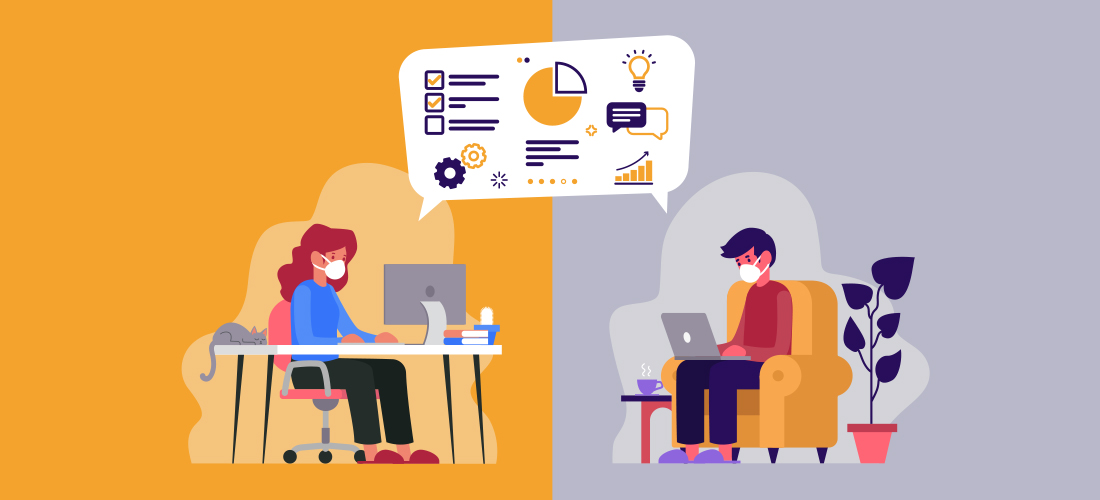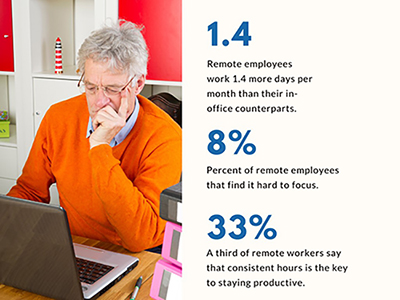 Contact
About Us
Articles
Home
Contact
About Us
Articles
Home

An opportunity to work from home in another reality might sound like a dream. Most people assume that working from home means enjoying a more relaxed schedule while responding to emails in your pajamas. However, working from home is currently part of a complicated reality that many people are trying to navigate during the pandemic. This sudden shift can have serious implications for mental health.
Let's look at some facts behind the reality of working from home based on one survey:
You may feel overwhelmed by the task of suddenly balancing your home life and work life. Unfortunately, the strain and loss of boundaries involved can impact your mental health. There are three big issues to look out for while navigating this new dynamic of working from home amid a pandemic. Let's talk about the red flags and solutions.
Working at your desk without human interaction for days on end can take a toll on your physical and mental health. Feelings of loneliness can be even deeper if you live alone. However, having other people in your household certainly doesn't make you immune to the effects of isolation while you work from home.
We know from research that loneliness comes with risks. Isolation is shown to be equally as harmful to physical and mental health as obesity. In fact, researchers have discovered a linear connection between social isolation and mortality.
Technology may have to fill in some of the gaps that would normally be filled by human interaction or meetings with a counselor. Many workers are using resources like Zoom to have meetings or “happy hours" with colleagues. Consider peppering your calendar with quick "coffee meetings" with colleagues at various times during the day to break up the monotony.
It's also important to keep in touch with friends and family even if you're physically separated. It may be tempting to unwind with a movie or Netflix series after a long day of working from home. This can certainly be part of a healthy coping plan. Do consider making an arrangement to contact one person you know in "real life" for every four hours of entertainment that you consume. Even a simple phone call or video "chat" session will do! This is a nice strategy for maintaining connections during a quarantine situation.
You may feel like you don't recognize yourself if you're normally the person who shows up to the office 30 minutes early every morning with a coffee in your hand, a to-do list buzzing in your brain and a can-do attitude. You could even find it difficult to get out of bed to start your workday. What you're experiencing flies in the face of reports that people who work from home are actually more productive. Of course, productivity doesn't flourish when people are forced to work from home due to quarantine. The uncertainty and stress of quarantine can lead to depression and loss of motivation.
Focusing on the elements of your day that you can structure is important. Try to recreate the "workday" experience that you're used to using whatever resources you can. It's helpful to create a designated workspace in your home that offers natural light, an ergonomic chair and freedom from distractions. Working from your bed or kitchen table can make it difficult to separate your work mindset from your home mindset.
If you're extroverted, you may miss the feeling of being energized by interacting with your colleagues or clients in person. It will be important to find new, healthy ways to get energized. Beginning your morning with a workout or brisk walk could give you an endorphin boost that leads to a more productive day. Don't forget the role that music can play in boosting mood. Music therapy has been proven to help alleviate depression symptoms. Why not put on some uplifting beats while you work?

To say that the divide between work and home has been blurred is a gross understatement. The line between work life and home life is officially invisible if you're working from home on a full-time basis. It's easy to slip into a mode of working around the clock. However, jumping in and out of work mode while you carry on with your home life can be bad for both your mental health and productivity levels. This is a recipe for something called burnout.
Burnout is a real phenomenon that can impact your mental health and performance. It is a state of intense exhaustion precipitated by prolonged stress. Here's what you might experience:
Unfortunately, you're at higher risk for burnout if you work from home. You're likely working longer hours without even realizing it because there's no "off" button when your home is your office. What's more, supervisors and colleagues may be encroaching on your personal time now that it feels like schedules are fluid.
Make the choice to maintain clearly defined work hours. Try to keep a standard workday. Yes, you may need to plug in here and there to check the progress of emails or deadlines. However, that should be the exception instead of the new normal. Make an effort to shut off email notifications or silence your phone at the end of your workday. It's important to enjoy dinner or take a walk outside without feeling like you're still on the clock.
Yes, keeping up with job responsibilities is important while working from home during the pandemic. However, your mental health also needs to be a priority. Commit to creating a new routine that makes you excited to get up in the morning.
Alliance America is an insurance and financial services company. Our financial planners and retirement income certified professionals can assist you in maximizing your retirement resources and help you to achieve your future goals. We have access to an array of products and services, all focused on helping you enjoy the retirement lifestyle you want and deserve. You can request a no-cost, no-obligation consultation by calling (833) 219-6884 today.


